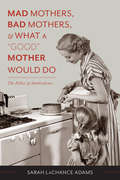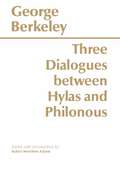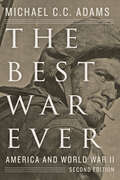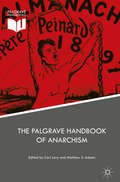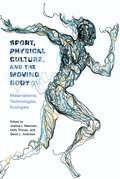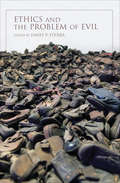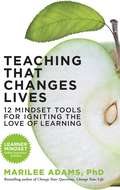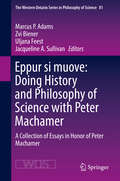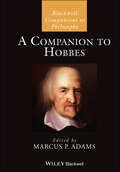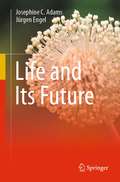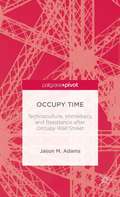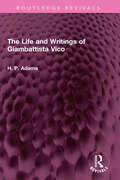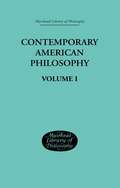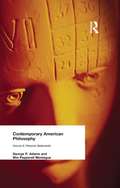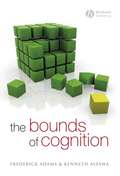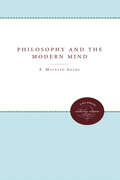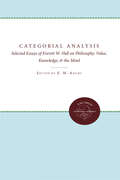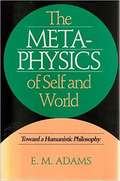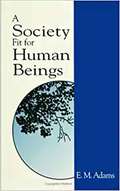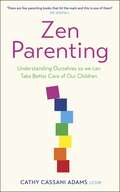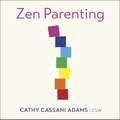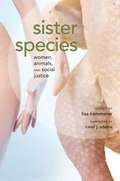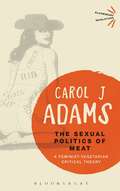- Table View
- List View
Mad Mothers, Bad Mothers, and What a "Good" Mother Would Do
by Sarah Lachance AdamsWhen a mother kills her child, we call her a bad mother, but, as this book shows, even mothers who intend to do their children harm are not easily categorized as "mad" or "bad." Maternal love is a complex emotion rich with contradictory impulses and desires, and motherhood is a conflicted state in which women constantly renegotiate the needs mother and child, the self and the other. Applying care ethics philosophy and the work of Emmanuel Levinas, Maurice Merleau-Ponty, and Simone de Beauvoir to real-world experiences of motherhood, Sarah LaChance Adams throws the inherent tensions of motherhood into sharp relief, drawing a more nuanced portrait of the mother and child relationship than previously conceived. The maternal example is particularly instructive for ethical theory, highlighting the dynamics of human interdependence while also affirming separate interests. LaChance Adams particularly focuses on maternal ambivalence and its morally productive role in reinforcing the divergence between oneself and others, helping to recognize the particularities of situation, and negotiating the difference between one's own needs and the desires of others. She ultimately argues maternal filicide is a social problem requiring a collective solution that ethical philosophy and philosophies of care can inform.
Three Dialogues Between Hylas and Philonous
by Robert M. Adams George BerkeleyA model of what an edition of a philosohic text for an introductory level should be. Introduction does an admirable job of putting Berkeley's thought in the intellectual context of its time. --Gary C. Hatfield
Habermas and Theology
by Nicholas AdamsHow can the world's religious traditions debate within the public sphereï 1/2 In this book Nicholas Adams shows the importance of Habermas' approaches to this question. The full range of Habermas' work is considered, with detailed commentary on the more difficult texts. Adams energetically rebuts some of Habermas' arguments, particularly those which postulate the irrationality or stability of religious thought. Members of different religious traditions need to understand their own ethical positions as part of a process of development involving ongoing disagreements, rather than a stable unchanging morality. Public debate additionally requires learning each other's patterns of disagreement. Adams argues that rather than suspending their deep reasoning to facilitate debate, as Habermas suggests, religious traditions must make their reasoning public, and that 'scriptural reasoning' is a possible model for this. Habermas overestimates the stability of religious traditions. This book offers a more realistic assessment of the difficulties and opportunities they face.
The Best War Ever: America and World War II (The American Moment)
by Michael C. AdamsThe most readable—and searingly honest—short book ever written on this pivotal conflict.Was World War II really such a "good war"? Popular memory insists that it was, in fact, "the best war ever." After all, we knew who the enemy was, and we understood what we were fighting for. The war was good for the economy. It was liberating for women. A battle of tanks and airplanes, it was a "cleaner" war than World War I. Although we did not seek the conflict—or so we believed—Americans nevertheless rallied in support of the war effort, and the nation's soldiers, all twelve million of them, were proud to fight. But according to historian Michael C. C. Adams, our memory of the war era as a golden age is distorted. It has left us with a misleading—even dangerous—legacy, one enhanced by the nostalgia-tinged retrospectives of Stephen E. Ambrose and Tom Brokaw. Disputing many of our common assumptions about the period, Adams argues in The Best War Ever that our celebratory experience of World War II is marred by darker and more sordid realities. In the book, originally published in 1994, Adams challenges stereotypes to present a view of World War II that avoids the simplistic extremes of both glorification and vilification. The Best War Ever charts the complex diplomatic problems of the 1930s and reveals the realities of ground combat: no moral triumph, it was in truth a brutal slog across a blasted landscape. Adams also exposes the myth that the home front was fully united behind the war effort, demonstrating how class, race, gender, and age divisions split Americans. Meanwhile, in Europe and Asia, shell-shocked soldiers grappled with emotional and physical trauma, rigorously enforced segregation, and rampant venereal disease.In preparing this must-read new edition, Adams has consulted some seventy additional sources on topics as varied as the origins of Social Security and a national health system, the Allied strategic bombing campaign, and the relationship of traumatic brain injuries to the adjustment problems of veterans. The revised book also incorporates substantial developments that have occurred in our understanding of the course and character of the war, particularly in terms of the human consequences of fighting. In a new chapter, "The Life Cycle of a Myth," Adams charts image-making about the war from its inception to the present. He contrasts it with modern-day rhetoric surrounding the War on Terror, while analyzing the real-world consequences that result from distorting the past, including the dangerous idea that only through (perpetual) military conflict can we achieve lasting peace.
Constitutionalism and the Rule of Law
by Maurice Adams Anne Meuwese Ballin Ernst HirschRule of law and constitutionalist ideals are understood by many, if not most, as necessary to create a just political order. Defying the traditional division between normative and positive theoretical approaches, this book explores how political reality on the one hand, and constitutional ideals on the other, mutually inform and influence each other. Seventeen chapters from leading international scholars cover a diverse range of topics and case studies to test the hypothesis that the best normative theories, including those regarding the role of constitutions, constitutionalism and the rule of law, conceive of the ideal and the real as mutually regulating.
The Palgrave Handbook of Anarchism
by Matthew S. Adams Carl LevyThis handbook unites leading scholars from around the world in exploring anarchism as a political ideology, from an examination of its core principles, an analysis of its history, and an assessment of its contribution to the struggles that face humanity today. Grounded in a conceptual and historical approach, each entry charts what is distinctive about the anarchist response to particular intellectual, political, cultural and social phenomena, and considers how these values have changed over time. At its heart is a sustained process of conceptual definition and an extended examination of the core claims of this frequently misunderstood political tradition. It is the definitive scholarly reference work on anarchism as a political ideology, and should be a crucial text for scholars, students, and activists alike.
Sport, Physical Culture, and the Moving Body: Materialisms, Technologies, Ecologies (Critical Issues in Sport and Society)
by Mary Louise Adams Kiri Baxter Douglas Booth Kyle S Bunds Michael D. Giardina Mariana Clark Simon C Darnell Samantha Frost Simone Fullagar Pirkko Markula Mary G. McDonald Jennifer Sterling Christopher McLeod Matthew G. Hawzen Richard Pringle Oliver Rick Jacob J. Bustad Samantha King Shannon Leigh Jette Katelyn Esmonde David Andrews Carolyn Pluim Gavin WeedonThe moving body—pervasively occupied by fitness activities, intense training and dieting regimes, recreational practices, and high-profile sporting mega-events—holds a vital function in contemporary society. As the body moves—as it performs, sweats, runs, and jumps—it sets in motion an intricate web of scientific rationalities, spatial arrangements, corporate imperatives, and identity politics (i.e. politics of gender, race, social class, etc.). It represents vitality in its productive and physiological capacities, it drives a complex economy of experiences and products, and it is a meaningful site of cultural identities and politics. Contributors to Sport, Physical Culture, and the Moving Body work from a simple premise: as it moves, the material body matters. Adding to the burgeoning fields of sport studies and body studies, the works featured here draw upon the traditions of feminist theory, posthumanism, actor network theory, and new materialism to reposition the physical, moving body as crucial to the cultural, political, environmental, and economic systems that it constitutes and within which is constituted. Once assembled, the book presents a study of bodies in motion—made to move in contexts where technique, performance, speed, strength, and vitality not only define the conduct therein, but provide the very reason for the body’s being within those economies and environments. In so doing, the contributors look to how the body moving for and about rational systems of science, medicine, markets, and geopolity shapes the social and material world in important and unexpected ways. In Sport, Physical Culture, and the Moving Body, contributors explore the extent to which the body, when moving about both ostensibly active body spaces (i.e., the gymnasium, the ball field, exercise laboratory, the track or running trail, the beach, or the sport stadium) and those places less often connected to physical activity (i.e. the home, the street, the classroom, the automobile), is bounded to technologies of life and living; and to the political arrangements that seek to capitalize upon such frames of biological vitality. To do so, the authors problematize the rise of active body science (i.e. kinesiology, sport and exercise sciences, performance biotechnology) and the effects these scientific interventions have on embodied, lived experience. Contributors to Sport, Physical Culture, and the Moving Body will be engaging a range of new and emerging theoretical perspectives, including new materialist, political ecology, developmental systems theory, and new material feminist approaches, to examine the actors and assemblages of movement-based material, political, and economic production. In so doing, contributors will vividly and powerfully illustrate the extent to which a focus on the fleshed body and its material conditions can bring forth new insights or ontological and epistemological innovation to the sociology of sport and physical activity. They will also explore the agency of the body as and amongst things. Such a performative materialist approach explicates how complex assemblages of sport and physical activity—bringing into association everything from muscle fibers and dietary proteins to stadium concrete or regional aquifers—are not only meaningful, but ecological. By focusing on the confluence of agentive materialities, disciplinary technologies, vibrant assemblages, speculative realities, and vital performativities, Sport, Physical Culture, and the Moving Body promises to offer a groundbreaking departure from representationalist tendencies and orthodoxies brought about by the cultural turn in sport and physical cultural studies. It brings the moving body and its physics back into focus: recentering moving flesh and bones as locus of social order, environmental change, and the global political economy.
Ethics and the Problem of Evil (Indiana Series in the Philosophy of Religion)
by Marilyn McCord Adams John Hare Linda Zagzebski Laura Garcia Bruce Russell Stephen J. Wykstra Stephen MaitzenProvocative essays that seek &“to turn the attention of analytic philosophy of religion on the problem of evil . . . towards advances in ethical theory&” (Reading Religion). The contributors to this book—Marilyn McCord Adams, John Hare, Linda Zagzebski, Laura Garcia, Bruce Russell, Stephen Wykstra, and Stephen Maitzen—attended two University of Notre Dame conferences in which they addressed the thesis that there are yet untapped resources in ethical theory for affecting a more adequate solution to the problem of evil. The problem of evil has been an extremely active area of study in the philosophy of religion for many years. Until now, most sources have focused on logical, metaphysical, and epistemological issues, leaving moral questions as open territory. With the resources of ethical theory firmly in hand, this volume provides lively insight into this ageless philosophical issue. &“These essays—and others—will be of primary interest to scholars working in analytic philosophy of religion from a self-consciously Christian standpoint, but its audience is not limited to such persons. The book offers illustrative examples of how scholars in philosophy of religion understand their aims and how they go about making their arguments . . . hopefully more work will follow this volume&’s lead.&”—Reading Religion &“Recommended.&”—Choice
Teaching That Changes Lives
by Marilee G. AdamsIgniting the Love of Learning In response to educators who are already fans of her bestseller Change Your Questions, Change Your Life, Marilee Adams, the originator of Question Thinking, presents a compelling model for creating a classroom environment infused with curiosity, creativity, and caring. Through a moving story of a teacher on the verge of burnout, Adams demonstrates the powerful influence our mindsets have on how we interact with our students, our colleagues, and ourselves. Through vivid examples, she illustrates how cultivating what she calls a Learner Mindset leads to breakthroughs in critical thinking, communication, and collaboration. Complete with Adams's Choice Map for identifying our own mindsets, a workbook, and access to online resources, this inspiring book will transform teachers and students alike into open-minded, creative, resilient problem solvers and lifelong learners.
Eppur si muove: Doing History and Philosophy of Science with Peter Machamer
by Marcus P. Adams Zvi Biener Uljana Feest Jacqueline A. SullivanThis volume is a collection of original essays focusing on a wide range of topics in the History and Philosophy of Science. It is a festschrift for Peter Machamer, which includes contributions from scholars who, at one time or another, were his students. The essays bring together analyses of issues and debates spanning from early modern science and philosophy through the 21st century. Machamer's influence is reflected in the volume's broad range of topics. These include: underdetermination, scientific practice, scientific models, mechanistic explanation in contemporary and historical science, values in science, the relationship between philosophy and psychology, experimentation, supervenience and reductionism.
A Companion to Hobbes (Blackwell Companions to Philosophy)
by Marcus P. AdamsOffers comprehensive treatment of Thomas Hobbes’s thought, providing readers with different ways of understanding Hobbes as a systematic philosopher As one of the founders of modern political philosophy, Thomas Hobbes is best known for his ideas regarding the nature of legitimate government and the necessity of society submitting to the absolute authority of sovereign power. Yet Hobbes produced a wide range of writings, from translations of texts by Homer and Thucydides, to interpretations of Biblical books, to works devoted to geometry, optics, morality, and religion. Hobbes viewed himself as presenting a unified method for theoretical and practical science—an interconnected system of philosophy that provides many entry points into his thought. A Companion to Hobbes is an expertly curated collection of essays offering close textual engagement with the thought of Thomas Hobbes in his major works while probing his ideas regarding natural philosophy, mathematics, human nature, civil philosophy, religion, and more. The Companion discusses the ways in which scholars have tried to understand the unity and diversity of Hobbes’s philosophical system and examines the reception of the different parts of Hobbes’s philosophy by thinkers such as René Descartes, Margaret Cavendish, David Hume, and Immanuel Kant. Presenting a diversity of fresh perspectives by both emerging and established scholars, this volume: Provides a comprehensive treatment of Hobbes’s thought in his works, including Elements of Law, Elements of Philosophy, and Leviathan Explores the connecting points between Hobbes’ metaphysics, epistemology, mathematics, natural philosophy, morality, and civil philosophy Offers readers strategies for understanding how the parts of Hobbes’s philosophical system fit together Examines Hobbes’s philosophy of mathematics and his attempts to understand geometrical objects and definitions Considers Hobbes’s philosophy in contexts such as the natural state of humans, gender relations, and materialist worldviews Challenges conceptions of Hobbes’s moral theory and his views about the rights of sovereigns Part of the acclaimed Blackwell Companions to Philosophy series, A Companion to Hobbes is an invaluable resource for scholars and advanced students of Early modern thought, particularly those from disciplines such as History of Philosophy, Political Philosophy, Intellectual History, History of Politics, Political Theory, and English.
Life and Its Future
by Josephine C. Adams Jürgen EngelThis book is aimed at those who wish to understand more about the molecular basis of life and how life on earth may change in coming centuries. Readers of this book will gain knowledge of how life began on Earth, the natural processes that have led to the great diversity of biological organisms that exist today, recent research into the possibility of life on other planets, and how the future of life on earth faces unprecedented pressures from human-made activities. Readers will obtain a perspective on the potential risks of chemical or nuclear warfare, and the ever-increasing risks from human activities that are causing pollution and climate change with global heating. Readers will also learn about ongoing research efforts to generate “designer lifeforms” through synthetic biology and applications of artificial intelligence. The book makes an integrated, up-to-date, overview of topics often considered as separate fields. It should be valuable to students, teachers, and people who are concerned about the future of life.
Occupy Time
by Jason M. AdamsWhile secondary texts on Paul Virilio typically see no way out of the tempo- and techno-dystopia he articulates, Occupy Time engages the events of Occupy Wall Street to fix attention on what such readings circumvent: Virilio's elusive theory of resistance.
The Life and Writings of Giambattista Vico (Routledge Revivals)
by H. P. AdamsFirst published in 1935, The Life and Writings of Giambattista Vico is a succinct biography of the Italian philosopher, Giambattista Vico. Carefully documented, the book comments on Vico’s life as well as his oeuvre in a bid to extend his audience to the English-speaking population. From his early childhood to the influence of his writings after his death, the book provides a keen insight into the many facets of his philosophy. This book will be of interest to students of philosophy and history.
Contemporary American Philosophy: Personal Statements Volume I (Muirhead Library Of Philosophy Ser.)
by Adams, George P and Montague, Wm PepperellFirst published in 2002. Routledge is an imprint of Taylor & Francis, an informa company.
Contemporary American Philosophy: Personal Statements Volume II (Muirhead Library Of Philosophy Ser.)
by Adams, George P and Montague, Wm PepperellFirst published in 2002. Routledge is an imprint of Taylor & Francis, an informa company.
The Bounds of Cognition
by Frederick Adams Kenneth AizawaAn alarming number of philosophers and cognitive scientists have argued that mind extends beyond the brain and body. This book evaluates these arguments and suggests that, typically, it does not. A timely and relevant study that exposes the need to develop a more sophisticated theory of cognition, while pointing to a bold new direction in exploring the nature of cognition Articulates and defends the “mark of the cognitive”, a common sense theory used to distinguish between cognitive and non-cognitive processes Challenges the current popularity of extended cognition theory through critical analysis and by pointing out fallacies and shortcoming in the literature Stimulates discussions that will advance debate about the nature of cognition in the cognitive sciences
Philosophy and the Modern Mind
by E. Maynard AdamsIn this unique philosophical critique of modern Western civilization, Adams argues that contemporary culture is deranged by false assumptions about the human mind. He sees a growing gap between the subjectivistic culture and the structure of reality which has not only produced Originally published 1975.A UNC Press Enduring Edition -- UNC Press Enduring Editions use the latest in digital technology to make available again books from our distinguished backlist that were previously out of print. These editions are published unaltered from the original, and are presented in affordable paperback formats, bringing readers both historical and cultural value.
Categorial Analysis: Selected Essays of Everett W. Hall on Philosophy, Value, Knowledge, and the Mind
by E. M. AdamsThe essays in this volume have been selected for their contribution to Everett W. Hall's mature philosophical position, which was grounded in careful linguistic analysis and directed toward philosophically clarifying the major areas of culture. He emerges as skillful, meticulous, and patient in his exploration of language as a means of interpreting the categorial structure of the world.Originally published in 1964.A UNC Press Enduring Edition -- UNC Press Enduring Editions use the latest in digital technology to make available again books from our distinguished backlist that were previously out of print. These editions are published unaltered from the original, and are presented in affordable paperback formats, bringing readers both historical and cultural value.
The Metaphysics Of Self And World: Toward A Humanistic Philosophy
by E. M. AdamsA great fissure occurred in Western civilization in the early modern period with the divorce between the humanities and the sciences and the rise of scientific naturalism. This title presents a philosophical exploration of the relationship between the individual, the culture, and the world.
A Society Fit For Human Beings (Suny Series In Constructive Postmodern Thought Ser.)
by E. M. AdamsArgues for a humanistic cultural reformation to counter our materialistic values and science-dominated intellectual life and shows how this would affect our lives and transform our society.
Zen Parenting: Understanding Ourselves so we can Take Better Care of Our Children
by Cathy Cassani Adams'There are few parenting books that hit the mark and this is one of them!' Dr ShefaliWe can't always plan for what's next - that's been made more and more clear in the past few years. The truth is that life is never predictable, especially for parents. What is possible is an unlimited capacity for compassion and caring - for yourself and your children. As you navigate the uncertainty with openness and humility, you find the clarity, connection, and community that is Zen Parenting. Using the seven chakras, therapist Cathy Cassani Adams discusses parenting issues such as school pressure, self-care, emotional intelligence, anxiety, sexuality and gender, and more, while offering concrete examples and strategies to help you wake up to your life as a parent. Zen Parenting guides you to:- Establish your physical, emotional and mental foundation- Practice creativity and how to access your emotions- Develop your sense of self and allow your kids to do the same- Experience openheartedness, empathy and compassion- Discover genuine and meaningful communication- Explore mindfulness, meditation and your own intuition- Connect to something greater than yourself
Zen Parenting: Understanding Ourselves so we can Take Better Care of Our Children
by Cathy Cassani AdamsAn audiobook that helps parents to pay attention to daily life and the relationships they are creating with their children.We easily fall into the trap of parenting without a real awareness of what we're doing and why we're doing it, invariably using other peoples' ideas and values or outdated child-rearing techniques.A Zen Parent, is not a label or prescriptive way to parent, but a willingness to stay present with what's happening and do the right thing. It's a commitment to an imperfect practice of continual self-awareness so we can show up for our children in an authentic and mindful way. The one thing that can be counted on throughout parenting is change - just when we understand our child's experience or buy the right size clothes, they change and grow. Just when we get comfortable with typical life challenges, the world experiences a global pandemic. Being able to parent and live well requires a willingness to get comfortable with disorder and uncertainty, and even more of a willingness to be introspective and creative to once again find reorder.Structured through the 7 bodily chakras, which are used as a framework for human existence, this book is for parents who want to raise their children in a more self-aware and mindful way, to expand their thinking about who they are and what they want to share with their kids. It's a self-study and reminder to pay attention to daily life and the relationships they are creating with their children. And it's an opportunity to live what they want their kids to learn, to show up as themselves so their kids know they can do the same.(P) 2022 Hachette Audio
Sister Species: Women, Animals and Social Justice
by Carol J. Adams Lisa A. KemmererSister Species: Women, Animals, and Social Justice addresses interconnections between speciesism, sexism, racism, and homophobia, clarifying why social justice activists in the twenty-first century must challenge intersecting forms of oppression. This anthology presents bold and gripping--sometimes horrifying--personal narratives from fourteen activists who have personally explored links of oppression between humans and animals, including such exploitative enterprises as cockfighting, factory farming, vivisection, and the bushmeat trade. Sister Species asks readers to rethink how they view "others," how they affect animals with their daily choices, and how they might bring change for all who are abused. These essays remind readers that women have always been important to social justice and animal advocacy, and they urge each of us to recognize the links that continue to bind all oppressed individuals. The astonishing honesty of these contributors demonstrates with painful clarity why every woman should be an animal activist and why every animal activist should be a feminist. Contributors are Carol J. Adams, Tara Sophia Bahna-James, Karen Davis, Elizabeth Jane Farians, Hope Ferdowsian, Linda Fisher, Twyla François, Christine Garcia, A. Breeze Harper, Sangamithra Iyer, Pattrice Jones, Lisa Kemmerer, Allison Lance, Ingrid Newkirk, Lauren Ornelas, and Miyun Park.
The Sexual Politics of Meat: A Feminist-Vegetarian Critical Theory
by Carol J. AdamsThe Sexual Politics of Meat is Carol Adams' inspiring and controversial exploration of the interplay between contemporary society's ingrained cultural misogyny and its obsession with meat and masculinity. Published in the year of the book's 25th anniversary, the Bloomsbury Revelations edition includes a substantial new afterword, including more than 20 new images and discussions of recent events.
